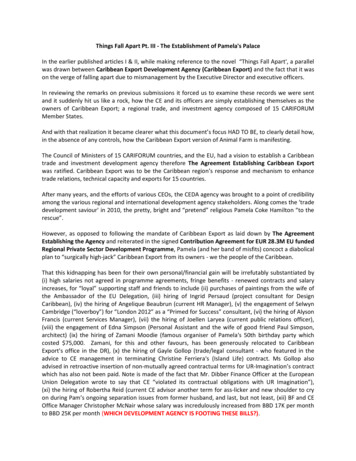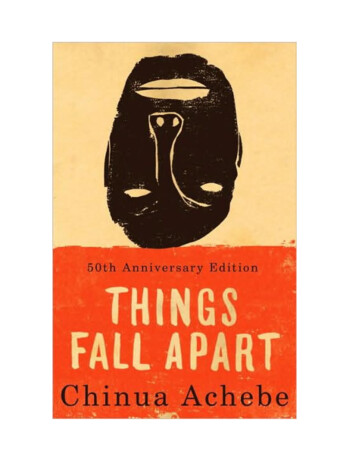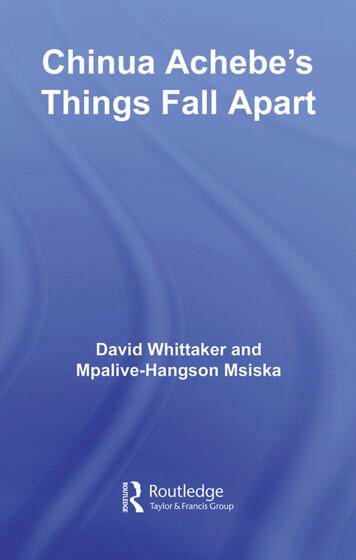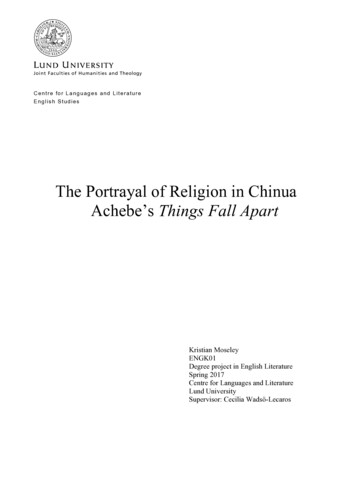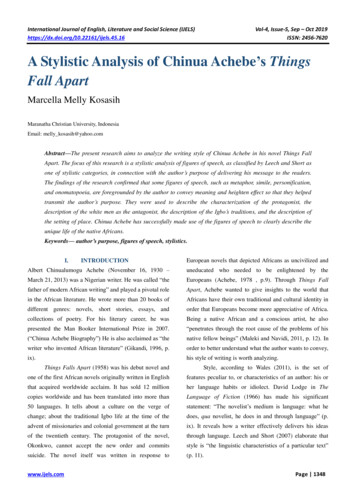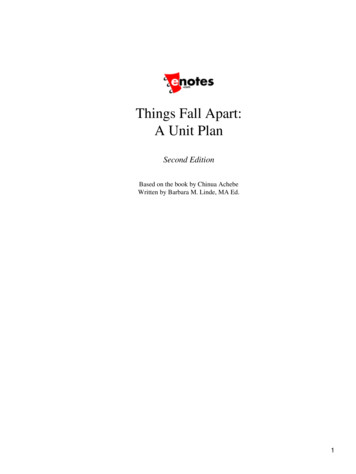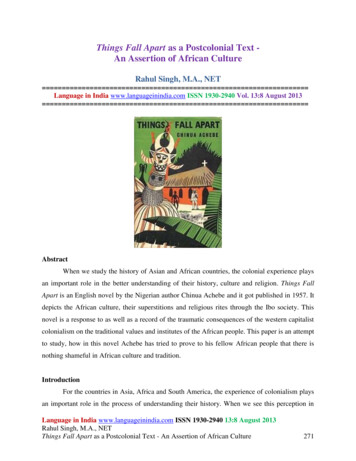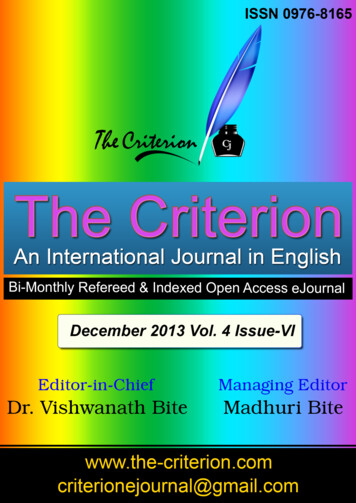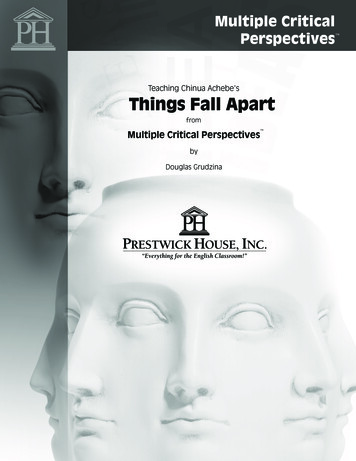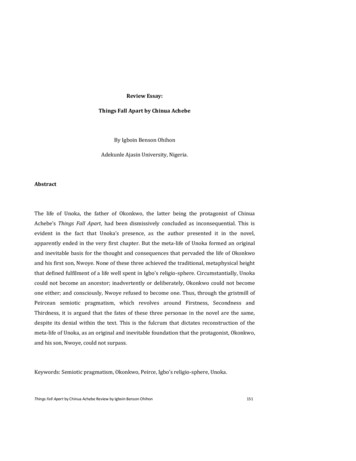
Transcription
Beteckning:Akademin för utbildning och ekonomiWhy do Things Fall Apart?A Psychological Analysis of Okonkwo'sPersonality and his Ultimate Demise in ChinuaAchebe's Novel Things Fall Apart.Justin CowlinJan 2011C- Essay, 15pLiteratureEnglish CSupervisor: Mia Mårdberg, Ph.DExaminer: Alan Shima, Ph.D
TABLE OF CONTENTS1. INTRODUCTION 22. PLOT SUMMARY . .33. PSYCHOANALYTIC APPROACH . . 54. ANALYSIS . 104.1 The Simple Male Oedipus Complex . .124.2 The Reflection of my Father .154.3 Breaking the Sacred Week of Peace . .184.4 Okonkwo‟s Worst Crime . .194.5 A Mere Reflection of my Former Self. . .215CONCLUSION . . .226BIBLIOGRAPHY .24
21. INTRODUCTIONRespected as one of the founders of the modern Nigerian literary movement, Chinua Achebeborn the child of a protestant missionary later rejected his Christian name, Albert, in place forhis indigenous one, Chinua. Publishing his novel Things Fall Apart in 1959, Achebe sought toconvey his own unique understanding of “Africanness” (Ogbaa 3). Opposed to pastpostcolonial representations of Africa as „exotic‟ and the immoral „Other‟, Achebe sought toconvey a fuller understanding of the indigenous Ibo people. Subsequently, he sought to givevoice to an otherwise underrepresented and exploited colonial subject and challenge thenotion of Africa as a vacuum, prior to the coming of Europe (Ogbaa 16). Set in the 1880‟s,Achebe‟s novel portrays the clash between the British colonial government and the traditionalculture of the indigenous Ibo people. More importantly for this essay the novel depicts therise and fall of the protagonist Okonkwo, a wealthy and respected warrior of the Umuofiaclan. Educated in Ibada, one of several universities implemented by the British colonialgovernment, Achebe was afforded a unique insight into European and African perspectivesof colonialism. Tired of the primitive European perception of „other‟ cultures portrayed withinthe Western literary canon, Achebe sought to capture the African voice. His choice oflanguage and decision to respond to earlier European accounts of Africa was thus political(Okpewho 7).There are very few works not associated with the Western canon to have received asmuch attention as Chinua Achebe‟s novel Things Fall Apart (Ogbaa 1). Subsequently, a vastnumber of scholarly texts surrounding the many different themes included within Achebe‟snovel have been written. However, contrary to the many post-colonial interpretations of thisnovel, this essay will employ a psychoanalytical literary approach to discuss the cause of theprotagonist‟s eventual demise, based on the premise that human behaviour is driven by anunconscious process. Consequently, this essay will argue that following the ego‟s inability torepress the infantile demands of the unconscious, the preconscious and the conscious self,ever more compulsive, repetitive and neurotic behaviours are displayed. Subsequently, the
3protagonist‟s self-confidence turns to pride and his masculinity develops into totalitarian ruleleading to uncontrollable rage, Okonkwo‟s world literally falls apart. It should be noted that forthe purpose of this essay, I will limit my discussion to Freud‟s theory of the unconscious inmy interpretation of the protagonist Okonkwo. Finally, it is my understanding that Okonkwo‟srelationship to his mother plays a significant role in explaining the tense relationship with hisown father and sons. The analysis of this unique relationship will thus afford a more inclusiveunderstanding of what I presume to be the protagonist‟s repressed true emotions.”Psychoanalytical criticism is a form of literary criticism which uses some of thetechniques of psychoanalysis in the interpretation of literature” (Barry 96). Psychoanalytictheory partly consists of Freudian theories relating the mind, our instincts and sexuality and isbased on the premise that human behaviour is driven by an unconscious process. Thisanalysis will focus upon Freudian theories relating the interaction between what Freudhimself termed the id, the ego, the superego and the unconscious. Furthermore, this essaywill also utilise Anna Freud‟s theories relating human behaviour and defence mechanisms inorder to better interpret some of the protagonist‟s unruly actions. The principal defencemechanisms identified by Freud and later refined by his daughter Anna, include repression,displacement, regression, projection, introjection and sublimation. However, although the useof defence mechanisms may be viewed as a universal phenomenon among a wide variety ofindividuals, “When carried to an extreme they lead to compulsive, repetitive and neuroticbehaviour (Feist, Feist 34), which the protagonist, it will be argued, succumbs to all of theabove.Due to the fact that we know very little relating to the protagonist‟s own childhood andconsidering that the ego “the only region of the mind in contact with reality (Feist, Feist 29), isto some extent the product of our social surroundings, it is relevant to include a summary ofthe plot and background information of the culture to which the protagonist was exposed.This will not only facilitate a better understanding of the protagonist as a whole, but will help
4to explain why Okonkwo fears the „unmanly‟ reflection of his father, a man in conflict with thesocially constructed masculine norms common to Ibo cultural traditions.2. PLOT SUMMARYAchebe‟s novel Things Fall Apart depicts the rise and tragic fall of a wealthy and respectedwarrior named Okonkwo. Dissimilar to early postcolonial primordial perceptions of Africa, theIbo clan is culturally rich in tribal tradition and practices the worship of gods, communal living,war and magic. Leadership is based on an individual‟s personal worth, masculinity andcontribution to the good of the Ibo tribe. Raised from humble beginnings it soon becomesapparent that the protagonist‟s strengths are also his weaknesses: his self-confidence turnsto pride and his masculinity develops into totalitarian rule leading to uncontrollable rage.Haunted by the cowardly actions of his unmanly father Unoka, Okonkwo is determined tobecome everything his father never was: clansman, warrior and great leader. The father of atwelve-year-old son named Nwoye, Okonkwo fears his son is unmanly and will end up afailure just like his father Unoka.1As a prestigious member of his community and noted for his extraordinaryachievements, Okonkwo is rewarded with numerous titles and honours. In a settlement witha neighbouring tribe, the village is rewarded a virgin and a fifteen-year-old boy namedIkemefuna. The protagonist, charged the protection of the boy, finds an ideal and willing sonin Ikemefuna and a strong bond is struck between the two. However, despite the fact that theboy refers to his guardian as „father‟, the protagonist, Okonkwo, finds it very hard to showany sign of emotion for the boy. The protagonist receives a generous loan of 800 yams inorder to start a farm. Okonkwo‟s success, however, quickly begins to lead to his ultimatedemise, as his behaviour becomes ever more obsessive. The protagonist‟s totalitarian styleleadership and what I interpret to be the repression of his true emotions, embedded deep1It is the protagonist‟s belief that the „Yam‟ represents manliness and he who can provide for hisfamily is surely a great man. However, similarly to the protagonist‟s father, Unoka, his son, Nwoye,shows “disquieting signs of laziness” (25), aggravating the protagonist‟s fear of the „unmanly‟ reflectionof his father in his son.
5within his unconscious mind, lead to many conflicts with other members of the village, butmore importantly with his own family, who begin to fear him. During the week of peace,Okonkwo‟s hasty temper incites him to severely beat his youngest wife Ojiugo, breaking thetraditions of the festival that strictly forbids any form of violence. However, Okonkwo commitshis ultimate sin, following the sacrifice of his son Ikemefuna, which brings far-reachingconsequences for him and his family. Interesting, following his son, Nwoye‟s conversion tothe white man‟s religion, Okonkwo rejects the “effeminate” (Achebe 112) reflection of hisfather, now common to his son. Following the accidental death of a young boy, Okonkwoseeks refuge among his mother‟s kinsmen. However, during Okonkwo‟s absence Christianmissionaries begin to arrive in Umuofia with the intention of converting the indigenouspopulation to Christianity. Tension between the villagers and the missionaries finally explodewhen a Christian convert named Enoch eats a sacred python and publicly unmasks anegwugwu (an assembly of tribesmen masked as spirits), an act equivalent to killing anancestral spirit. The tribe retaliates by ostracizing the Christians and burning down theChristian church. In return the British call together the leaders of Umuofia in order to inducea dialogue between the two very different cultures, but retaliate by arresting all those inattendance.In the final chapters of Achebe‟s novel, Okonkwo returns from exile to the village ofUmuofia with hopes of reclaiming his former status and power within his community.However, life in Umuofia has changed drastically since the arrival of the Christianmissionaries, and the villagers are divided as to whether or not they should take action forthe imprisonment of their leaders. Expecting his fellow clan members to join him in uprising,Okonkwo kills their leader with his machete. When the crowd allows the other messengers toescape, Okonkwo realizes that his clan is not willing to go to war. The next day the Districtcommissioner himself arrives at the village to arrest Okonkwo, only to find that this oncegreat Umoufian warrior has tragically hanged himself.
63. PSYCHOANALYTIC APPROACHThe Freudian psychoanalytic approach is based on the premise that human behaviour isdriven by an unconscious process. In contrast to the prevailing train of thought of the time(1856-1939), which focused upon the image of a human as a rational conscious being,Sigmund Freud, a young Viennese physician theorised that the human psyche wasdominated by a more comprehensive realm of unconscious sexual and aggressive impulses.Dismissed by academic psychologists for most of the 20th century, scholars have alwayscontested and disputed questions surrounding the scientific validity of Freudian theory. “Wasit science or mere armchair speculation? Did Freud propose testable hypotheses? Are hisideas experimentally verifiable, testable or falsifiable” (Feist, Feist 53). However, despite theshortcomings of Freud‟s work as a scientific theory it remains one of the most powerful formsof modern literary interpretation for investigating an individual‟s unconscious thoughts andfeelings (Smith, Hoeksema and Fredrickson 459).In order to better understand human behaviour, Freud, developed a theoretical modelof the human psyche which employed three levels of consciousness – the conscious, thepreconscious, and the unconscious (Hjelle and Zielgler 85). According to Freud significantaspects of human behaviour are dominated by repressed unconscious primitive impulsesthat lay beyond the consciousness. He believed that this unconscious material such asforgotten childhood trauma, hostile feelings towards a parent and repressed sexual desireswere not only unattainable by the conscious psyche but responsible for much of oureveryday behaviour. Unconscious instinctual urges such as dreams or slips of the tongue,could however reveal symbolised forms of our unconscious psyche.Realising the simplicity of his conceptual model of mental life, Freud developed theprovinces of the mind and subdivided the human personality into: the id, the ego, and thesuperego (Hjelle and Zielgler 86). The id thought to be the most primitive, instinctive aspectof the personality lay in the unconscious, inaccessible to all forms of conscious thought. The
7only structure present at birth, the id is thought to be linked to our most instinctual biologicalimpulses such as the need to eat, drink, defecate and gain sexual pleasure. In fact, Freudbelieved that of all our primitive impulses aggression and the need to copulate were the mostinstinctual determinants of all human behaviour. Although expressed as a hypothesis, Freudbelieved the id to be “raw, animalistic, and chaotic, it knows no laws, obeys no rules andremains basic to the individual throughout life” (Hjelle and Zielgler 88). Similarly to a newborninfant‟s unconscious drive, the id seeks to avoid anxiety by satisfying its most basic desires.That is to say that the id solely serves what Freud termed the pleasure principle. Thisprocess included the immediate alleviation of built-up tension and would manifest itself in animpulsive, irrational, and narcissistic manner, regardless of the consequences for oneselfand others. Unable to comprehend fear and anxiety but more importantly reality, the id willnot attempt to consider reason which, Freud considered extremely dangerous for theindividual and or society (Hjelle and Zielgler 88).The ego, representing the self, is according to Freud the only part of the mind intouch with reality. Evolving from the id, the ego is said to function as a communicative toolwith the external world. As the only part of the mind in touch with reality, the ego which isgoverned by the reality principle dominates a person‟s personality. Although able to governthe strong urges of the pleasure principle of the id, the ego can lose control and succumb tothe id‟s most basic sexual and aggressive impulses. Susceptible to anxious torment, the egomust, in full view of the external world, inhibit the infantile demands of the unconscious, thepreconscious and the conscious self. Predictably, the ego must repress any sociallyinappropriate emotions, relying on defence mechanisms to protect it from angst (Feist, Feist29).According to Freud, the superego represented the moral and ideal aspects of one‟spersonality. Evolving from the ego, the superego unlike the ego is not in touch with theexternal world. Subsequently, the superego is indifferent to the well-being of the ego, andexerts unrealistic demands on the ego in its quest for perfection. Sexual and aggressive
8impulses are repressed by the ego. However, failure to repress the impulses in accordancewith the superego‟s moral ideals may result in a feeling of guilt and anxiety. Furthermore,should the ego fail to meet the superego’s high moral demands, feelings of weakness andinferiority will prevail (Feist, Feist 30).To summarise, Freud noted that the divisions between the id, the ego and thesuperego were far from clear and as unique and diverse as every person‟s individualpersonality. For instance, an individual in possession of a dominant id will be unable to resistthe insatiable impulse for pleasure, regardless of the consequences. Similarly, a weak egowhich is unable to control the unrealistic impulses of the id and/or the superego will result infeelings of anguish, guilt and inferiority. However, a well-rounded, balanced individual inpossession of a dominant ego which can inhibit the primeval impulses of the id (pleasureprinciple) and superego (moralistic principle) will not suffer from anxious torment or extremefluctuations of temperament and self-confidence (Feist, Feist 31).In order to avoid feelings of angst, the ego, the only part of one‟s psyche in touch withthe real world, must repress any unconscious socially inappropriate emotions, relying ondefence mechanisms to protect it from angst (Feist, Feist 34). However, although the use ofdefence mechanisms may be viewed as a universal phenomenon among a wide variety ofindividuals, “when carried to an extreme they lead to compulsive, repetitive, and neuroticbehaviour” (Feist, Feist 34). The principal defence mechanisms identified by Freud and laterrefined by his daughter Anna, and applicable within the scope of this essay includerepression, displacement, regression, projection, introjection and sublimation. Repression isthought to be an integral component among all defence mechanism and works by repressingthe inhibited sexual and aggressive impulses of the id and superego, in accordance withaccepted social norms (Feist, Feist 35).Displacement is the result of the ego alleviating angst by redirecting an impulse fromone object/person to another object/person. That is to say that hatred for one‟s own sibling
9may well be displaced or redirected to another object/person, maintaining a good relationshipwithin the family, and alleviating the ego of any unnecessary anxiety.Regression is the result of the libido‟s (sexual impulse/ drive) desire to regress toearlier more primitive stages of development when exposed to unwanted anxiety. An adultfor example may curl up into the foetal position, hide under a cover or in the case of theprotagonist in Achebe‟s novel, return home to one‟s mother.Overwhelmed by the infantile demands of the id and superego, the ego in an effort toprotect itself from angst, may attempt to project certain impulses onto other objects/persons.Termed Projection, Freud defined this mechanism as the ego‟s ability to project one‟s ownsocially undesirable characteristics such as fear and cowardice onto other objects and orpersons. This would have the effect of perceiving one‟s own faults, embedded deep withinthe unconscious mind, in others.Dissimilar to the example given above, Introjection defines the ego‟s ability to adoptpositive qualities characterised by other objects/persons. The authors Feist and Feist explainthat such introjections afford their host the feeling of an inflated sense of self-importance,motivated by self-interest, avoiding feelings of inadequacy.Sublimation “is the repression of the genital aim of Eros2 by substituting a cultural orsocial aim” (Feist, Feist 38). The sublimated aim or rather repressed material, is expressedinto something grander in the form of the arts, and or other noble social aim. Dissimilar toother defence mechanisms, sublimation may benefit both the individual and society. Freudbelieved that succeeding the phallic stage of development (3-4yrs of age), or introjection ofone‟s father, the young adolescent male developed sexual impulses towards his mother.Recognising the incompatibility of the two impulses, the son was thought to abandon theintrojection of his father in favour of the sexual impulses experienced towards his mother. Asa result, the father became his son‟s adversary in love and an aspiration to slaughter his2Eros- the desire for an enduring union with a loved one. (Feist, Feist G5)
10father was formed. According to Freud, this masculine behaviour emulating on the one hand,a sexual impulse towards the mother, yet hostility towards the father, defined thephenomenon termed the simple male Oedipus complex (Feist, Feist 41).In summary, defence mechanisms protect the ego from the infantile demands of theunconscious, the preconscious and the conscious self, alleviating the ego of anxiety.Considered a universal phenomenon in that it is a behaviour utilised among a wide variety ofindividuals, “when carried to an extreme they lead to compulsive, repetitive, and neuroticbehaviour” (Feist, Feist 34). Furthermore, the simple male Oedipus complex which can bedescribed in simple terms as a sexual impulse towards one‟s mother, resulting in theexpression of hostility towards one‟s father, may help to explain the tormented relationsbetween the protagonist and his father and sons.4. ANALYSISAchebe‟s novel can be divided into three central scenes consisting of the protagonist‟s risefrom humble beginnings, exile from the village Umuofia & his return to Umuofia. However,despite the author‟s depiction of a conflict between two very different cultures divided bymany variables such as gender, race, religion & age, this essay will explore the relationbetween human behaviour and the unconscious psyche in the analysis of the protagonist,Okonkwo‟s tragic demise.In the first chapters of the novel we are introduced to the protagonist, Okonkwo. Ayoung, physically strong and confident man whose “fame rested on solid personalachievements” (Achebe 3). Much-admired for his physical prowess in the ring, villagers stillspeak of Okonkwo‟s legendary wrestling attainments. In fact, based on his past successes,Umuofians award Okonkwo by appointing him leader of the emissaries of war to theneighbouring village Mbano. On his arrival to the village of Mbano, Okonkwo is treated withgreat honour and respect. On his return, Umuofians entrust the great warrior, Okonkwo, withthe custody of a young boy (Ikemefuna). Similarly, on starting a farm, Okonkwo, already a
11prestigious member of the community receives a generous loan of 800 yams. Interestingly,the loan is given on the premise that unlike his fellow clansmen, Okonkwo will surelysucceed and make good on his loan. This he does, despite the effects of a terrible drought.Undaunted by his humble beginnings and the devastating effects of nature, Okonkwoinevitably becomes one of Umoufias most respected and successful leaders.However, despite the novels introductory emphasis upon the masculine attributes andsuccesses of this great Umoufian warrior, the anxiety caused by the distaste for his father isall too apparent. For “He had no patience with unsuccessful men, he had no patience withhis father” (Achebe 3). Already, embedded within the third paragraph, we learn of theprotagonist‟s distaste for his father; a distaste which motivates the protagonist to overcomehis father Unoka‟s legacy. Cited throughout the first chapters it becomes apparent thatOkonkwo‟s father, Unoka, represents all that the Ibo tribesmen abhor. A gifted musician thatloves good fellowship, Unoka is portrayed as a man who lacks ambition, yet is gentle andsensitive to nature‟s ever changing beauty. However, Okonkwo‟s “life was dominated by fear,the fear of failure and weakness. It was not external but lay deep within himself. It was thefear of himself, lest he should be found to resemble his father” (Achebe 11).It may be suggested that the citation above is an example of the fear and anxiety thatlay deep within the protagonist‟s unconscious psyche. Though what is the cause ofOkonkwo‟s fear, his resentment, for despite his failings Unoka is a sensitive man and aloving father. “Do not despair. I know you will not despair. You have a manly and a proudheart. A proud heart can survive a general failure because such a failure does not prick itspride” (Achebe 19).These are not the words of a resentful father, nor adversary, but rather a parent whodespite his son‟s vengeful attacks offers him a loving, guiding and supporting hand, as anyloving parent would.His advice, however, tries “Okonkwo‟s patience beyond words”(Achebe 19). In order to understand the root of Okonkwo‟s demise and the anxiety that lay
12deep within his unconscious psyche, we must first understand the relationship to bothparents and in particular his mother which; when compared with the relationship betweenOkonkwo and his father, is set very much in the background. However, as noted earlier it ismy understanding that Okonkwo‟s relationship to his mother plays a significant role inexplaining the tense relationship with his own father and sons. Furthermore, the anxietycaused by the relationship to his mother will help to explain the cause of Okonkwo‟scompulsive, repetitive, and neurotic behaviour, which ultimately leads to his downfall.4.1 The Simple Male Oedipus ComplexInterestingly, despite having what I interpret to be a deepening affect upon the young boy‟srelationship with the external world, Achebe‟s novel contains but one substantive referenceto Okonkwo‟s mother throughout the entire novel (Okpewho 182). Consumed with thetortured relationship between Okonkwo and his father, and the overtly masculine traditionssynonymous with Achebe‟s depiction of Africa, the author fails to grant Okonkwo‟s mother aname. The allusion to his mother lasts but one short paragraph and is thus quoted below:Fort the first time in three nights, Okonkwo slept He stretched himself andscratched his thigh where a mosquito had bitten him as he slept. Another onewas wailing near his right ear. He slapped the ear and hoped he had killed it.Why do they always go for one‟s ear? When he was a child his mother hadtold him a story about it. But it was as silly as all women‟s stories. Mosquito,she had said, had asked Ear to marry him, whereupon Ear fell on the floor inuncontrollable laughter. How much longer do you think you will live? Sheasked. „You are already a skeleton‟. Mosquito went away humiliated, and anytime he passed her way he told Ear that he was still alive. Okonkwo turned onhis side and went back to sleep. (Achebe 55)The allusion to Okonkwo‟s mother as exemplified occurs in chapter nine and seems to holdno particular significance for the narrative as a whole. However, the allusion in question
13occurs but three days after the ritual murder of Okonkwo‟s adopted son Ikemefuna, an eventthat has caused the great Umoufian warrior much anxiety, an event which I shall examine inmore detail later on. Nevertheless, Okonkwo‟s painful anguish may be interpreted as a resultof the ego‟s inability to control the infantile demands of the unconscious mind, thus resultingin the protagonist‟s hand in the death of his adopted son, Ikemefuna. Unable to neither eatnor sleep for two whole days, the protagonist is obviously physically and emotionallyexhausted. On the third day he awakes in the middle of night, having come to terms with histerrible deed. However, it may be interpreted that following the protagonist‟s hand in thedeath of his son, Ikemefuna, Okonkwo is no longer ruled by the rational actions of his ego,nor conscious mind. On the contrary, it is the irrational impulses synonymous with hisunconscious id and superego that now govern the thoughts and actions of Umuofia‟sgreatest warrior. Having been abruptly awoken from the bite of a mosquito, his mind driftingbetween conscious and unconscious thought, it may be argued that it is in fact theprotagonist‟s superego, which partly consists of the internalised representations of the idealsand morals of overtly masculine Ibo society (Smith, Hoeksema and Fredrickson 460) thatform the basis of his rationalisation in coming to terms with his deed. If then the protagonist isnow governed by his unconscious mind (superego, id) it is significant that during his darkestdays he would reflect upon the childhood tales once spoken by his mother, the first woman toenter his life, the first woman to take a hold of his heart. Furthermore, although theprotagonist attempts to distant the obvious impulse to be close to his mother, “But it was assilly as all women‟s stories” (Achebe 55), it is significant that the memory of her soothingvoice, despite his anguish and fears, sends the protagonist straight back off to sleep.Following the accidental death of a young boy, a death for which Okonkwo is heldresponsible, Okonkwo‟s home is burnt to the ground, his live-stock is slaughtered and he isforced to flee Umuofia. It is significant that during the protagonist‟s most trying times hedecides to return to the memory of his mother, her last resting place on earth. Theprotagonist‟s actions may also be interpreted as a desire to regress to earlier more primitive
14stages of development having been exposed to unwanted anxiety. And as previouslyexemplified an adult may curl up into the foetal position, hide or as in the case of theprotagonist return home to the comforting embrace of the memory of one‟s mother.Although we know very little of the relationship between the protagonist and hismother, I feel it is fair to say that Achebe‟s novel includes strong evidence relating theprotagonists early rejection of his father. “Even as a little boy he had resented his father‟sfailure and weakness”. (Achebe 10) According to Freud, the rejection of one‟s fatherpreceded the development of sexual impulses for one‟s mother. Recognising theincompatibility of the two impulses, the son is thought to abandon the introjection of his fatherin favour of the sexual impulses experienced towards his mother. As a result, the fatherbecame his son‟s adversary in love and an aspiration to slaughter his father was formed.As mentioned above, the masculine behaviour emulating on the one hand a sexualimpulse towards the mother, yet hostility towards the father, defined what Freud termed thesimple male Oedipus complex (Feist, Feist 41). This would certainly explain the tenserelationship experienced between Okonkwo and his father which, from a Freudianperspective it has been argued is the result of Okonkwo‟s relationship to his mother.Furthermore, it may be argued that the relationship between Okonkwo and his mother andfear lest he should become his father is but a repression of the genital aim of Eros.3Motivated by the sublimated aim or repressed sexual material towards his mother, Okonkwois destined to overcome his father‟s legacy, a legacy he aspires to overcome regardless thecost. In fact, his obsession, lest he should succeed, can almost be considered the symbolicslaughter of his father. Motivated by his repressed sexual material, Okonkwo fears and hatesthe reflection of his father. A reflection, a legacy he must overcome. However, Okonkwo isnot privy to the infantile demands of his unconscious mind or the root of the fear, feeding hisanger. For this reason alone it is important when reflecting upon the actions of theprotagonist that one considers the ever increasing anxiety, building beneath the conscious3Eros- the desire for an enduring union with a loved one (Feist, Feist G5)
15self, yet motivat
his indigenous one, Chinua. Publishing his novel Things Fall Apart in 1959, Achebe sought to convey his own unique understanding of "Africanness" (Ogbaa 3). Opposed to past postcolonial representations of Africa as „exotic‟ and the immoral „Other‟, Achebe sought to convey a fuller understanding of the indigenous Ibo people.
